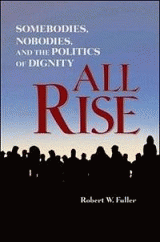This is the ninth part of the serialization of All Rise: Somebodies, Nobodies, and the Politics of Dignity (Berrett-Koehler, 2006). The ideas in this book are further developed in my recent novel The Rowan Tree.
CHAPTER 8: THE POLITICS OF DIGNITYDemocracy is the worst form of government, except for all the others that have been tried.
--Winston ChurchillAll the ills of democracy can be cured by more democracy.
--Alfred E. Smith, former governor of New York
The price of liberty is something more than eternal vigilance....We can save the rights we have inherited from our fathers only by winning new ones to bequeath our children.
--Henry Demarest Lloyd, American journalist and reformer
The previous chapters have discussed rankism in our social institutions and what can be done to curtail it. Here we address rankism in our civic institutions. What would politics look like if it were conducted in a dignitarian manner? What is the relationship between citizens and their leaders in a dignitarian government? Must partisan politics lead to ideological extremes or is there common ground that both conservatives and progressives can inhabit and thereupon work out their differences?
Before people take seriously the possibility of building dignitarian political institutions, they need an answer to a question I'm asked at every talk I give:
Is Rankism Human Nature?
In general, it's a rule of nature to pick on the weak--a strategy that minimizes the chance of retaliation. Since human beings are not unlike other species in this regard, it's natural to conclude that rankism is human nature and that's the whole story. But it's not. Yes, human beings are predators. But we're also changing rapidly. Numerous observers have made the case that we're now in the final phase of an epochal transition from predatory behavior to cooperative conduct.
Rankism is dominating, sometimes predatory, behavior, but it is not indelibly etched into our brains. In fact, the opposite is the case. The record shows that over the course of time, the weak have periodically rebelled against oppression and domination, often with striking success. Although this is usually the culmination of a long and harrowing process, human beings have repeatedly shown themselves capable of imposing limits on the authority of strongmen. Famous instances include the English barons at Runnymede who forced King John to sign the Magna Carta in 1215, the birth of parliaments limiting the absolute powers of sovereigns, colonials expelling their imperialist masters, and in the twentieth century, the global spread of democracy and the defeat or collapse of dictatorships that challenged it.
We have also witnessed the rise of organized labor and other mass movements, such as those for civil and women's rights, in response to discrimination and exploitation by a dominant group. It was long maintained that racism and sexism are indelible parts of human nature, but with every passing decade this belief becomes more indefensible. So while it must be acknowledged that we do have predatory tendencies, it's also clear that we're quite capable of reining them in and that this latter-day trend seems likely to prevail as our species matures.
At every point in our social evolution, power rules. Usually it's imminent and in your face--the police, the army--but every now and then what prevails is a novel combination of lesser forces that, through collaboration, first trump and then tame the existing authority. Sometimes all it takes to persuade those in charge to back down is to convince them that should things actually come to a fight, they will lose. Abuses of power persist until the individuals or institutions perpetrating them realize that they are facing a greater force. That force need not be, and usually is not, entirely material. As Gandhi,Martin Luther King, Jr., and Nelson Mandela proved, an important part of that force can be the moral might of an aroused citizenry.
In any case, once the opposition coalesces the rankist perpetrators either mend their ways or end up being ousted from their privileged positions. The long-term trend of this evolutionary process is the discovery of increasingly effective forms of cooperation that outperform, out-produce, and finally supplant abusive authoritarianism. Examples of this dynamic can be found in the myriad autocracies that have yielded to democracies and in the replacement of companies fueled by fear and humiliation with businesses providing work environments that protect people's dignity so that everyone, custodian and stockholder alike, reaps the benefits.
It is a goal of this book to make the principles of a dignitarian society palpable enough so the very thought of doing something that subjects others to indignity will provoke the countervailing realization that such a course would, in the longer term, prove self-defeating if not suicidal.
In addition to confronting the abuses that remain in our civic arena and social institutions, we must identify and eliminate those that occur between sovereign states, democratic or not, in the largely ungoverned realm of international affairs.
The DNA of Democracy: Watchdog Processes
Democracy is a strategy to combat the truth expressed in Lord Acton's oft-quoted dictum, "Power tends to corrupt and absolute power corrupts absolutely." It's the best model of governance we have for ensuring that officials do not misuse their station to the detriment of those they are supposed to serve.
The DNA of democracy consists of watchdog procedures through which we monitor our officials' actions and systems of accountability that circumscribe their prerogatives. Instead of assuming that authority figures will consistently respect human dignity, democracy assumes the opposite: that they will be tempted to place their personal interests ahead of the public's, and that if this causes the citizens indignity--well, that's just too bad. To prevent such self-serving lapses, we erect a system of constant "reminders," such as multiple political parties, elections, checks and balances including an independent judiciary, free media--all the institutions of democratic civil life--to hold their feet to the fire.
(Note: You can view every article as one long page if you sign up as an Advocate Member, or higher).





